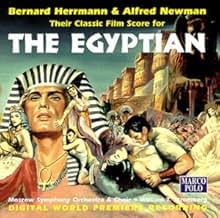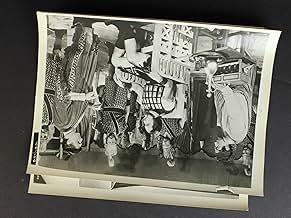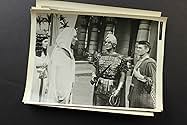Im alten Ägypten wird aus einem armen Waisenkind ein liebenswerter Arzt, der schließlich an den Hof des Pharaos bestellt wird, wo er Zeuge von Palastintrigen wird und gefährliche königliche ... Alles lesenIm alten Ägypten wird aus einem armen Waisenkind ein liebenswerter Arzt, der schließlich an den Hof des Pharaos bestellt wird, wo er Zeuge von Palastintrigen wird und gefährliche königliche Geheimnisse erfährt.Im alten Ägypten wird aus einem armen Waisenkind ein liebenswerter Arzt, der schließlich an den Hof des Pharaos bestellt wird, wo er Zeuge von Palastintrigen wird und gefährliche königliche Geheimnisse erfährt.
- Regie
- Drehbuch
- Hauptbesetzung
- Für 1 Oscar nominiert
- 1 Gewinn & 2 Nominierungen insgesamt
Empfohlene Bewertungen
And this pharaoh has another "flaw": He believes in one god instead of a pantheon of gods. Back then, this was totally revolutionary. Sinhue and Horemheb grow up. One night, Sinhue sees a woman who makes him lose his senses. He gives up his practice, sells his parents' home and even their tombs just to spend a night with her. Does he? I won't tell. Meanwhile, Merit, a tavern maid played with sweet simplicity belying strength by Jean Simmons, falls in love with Sinhue. She falls under his spell and under the spell of the belief in one god.
Victor Mature overacts perfectly as Horemheb. Edmond Purdom is sincere as Sinhue the lost physician (does he find redemption? Stay tuned). Even Bela Darvi, the woman who steals Sinhue's heart isn't as bad as everyone has said. The fact that she was Daryl F. Zanuck's mistress had nothing to do with the casting - right? Yeah, right...still, she wasn't that bad _ I've seen worse. I think she did better in "The Egyptian" than many of today's young actresses have done in anything. I said it before and I'll say it again -- I like this movie. I recommend it. It makes you think despite some hammy acting. Have fun with this movie; it's worth it.
Strange! Archaeological! Decadent! It is as if we are descending into some vault of antiquity, wherein might be great treasures, mixed with uncertain hazards. (One might imagine Darryl Zanuck commanding: 'Make it ancient!') Then, what a darkly dramatic story unfolds, all within the same tone set at the start.
Of Hollywood's mid-50s 'Egyptian Trilogy', 'The Ten Commandments' portrayed the civilization's sternness, the phenomenal 'Land of the Pharaohs' its nuts and bolts, while 'The Egyptian' shows it all, from glamour to tragedy, for us to wonder at.
No need to say much about the players here, but I think that, with the passage of time, Bella Darvi is being redeemed. What a perfect face for the role, right out of a Symbolist painting. If her acting does not please some, it might be argued that, in her role as a 'courtesan', she is obviously better in bed than yakking to some poor helpless admirer. I think that Curtiz captured the kinkiness of her sado-masochistic relationship with Edmund Purdom's character with aplomb, censorship being what it was at the time. Sir Peter Ustinov, in his memoirs, was pretty kind to 'The Egyptian', writing that it was 'like being lost in a huge set for 'Aida'. His pronunciation of the word 'beer' I have adopted myself ever after.(One of the film's historically accurate references: the Egyptian's invented beer!) Henry Daniell, egads, what a perfect performance. Gene Tierney, what a screen treasure. Bless DFZ for giving her this 'late' role. C'mon folks, don't be so hard on Victor Mature! He's a cheesemaker's son! Who rose to be pharaoh! Sounds like a peculiarly American opportunity. One of the best moments: John Carradine's existential observations on the sands of time. And Purdom's utterance about dwelling beyond the sunset of the world. If that isn't Grade 'A' epicness, what is?
Of course, along with everything else, the music is sublime. It is frequently noted that Alfred Newman and Bernard Herrmann created one of the screen's most compelling scores, perfectly harmonious, yet each theme is well developed, with a life of its own. Newman, pressed for time by DFZ, called in Herrmann, someone he could trust implicitly, to take up half the burden.
Benny, not the easiest guy to work with, obviously respected Newman enough to really deliver inspiring music. They alternated cues, an ingenious approach. No spoilers as to who did what here, but Benny brings an edge with him, mysterious, awesome sounds. Alfred brings fulsomeness, longing, poignancy. Both are consummately epic. Even when seen on a squeezed TV print, the effect of seeing the two composers' names side by side in the main credits, which the ultra-wide anamorphic screen could comfortably accommodate, is spine-tingling.
Leon Shamroy, the Dean of CinemaScope, does not let us down here. The lurid greens and moody shadows (probably distortions in all the terrible TV prints I've seen through the years) perfectly accompany the multi-dimensional script (by the great Philip Dunne and WB vet Casey Robinson, whom Curtiz must've brought with him to 20th). How remarkable it is that Shamroy, who was as much of an institution of cinematography at Fox as Newman was with music, would lens 'Cleopatra' a few years later, but in the brighter, sharper images of '60s Todd A-O. These old studio guys are really heroes of mine.
To me, who wants to fret about all the imperfections and criticism opportunities in a picture like this? I'd rather yield entirely to its spell, and dive off into its sea of lavishness, to emerge after the inspiring climax of 'The End' refreshed, moved, and hungry for more.
And yes, we should cry out to 20th-Fox for a DVD release worthy of DFZ's legacy.
Purdom is admittedly a bit stiff in the lead role, but one can accept this as part of Sinuhe's character. Victor Mature is, well, Victor Mature. Peter Ustinov is a delight to watch here , in the type of role which he always did so well and so wittily. Bella Darvi's performance as Nefer is classically camp, and I find even Michael Wilding's rather dry portrayal of Akhenaten to have its own appeal.
The historical oddity of Akhenaten's monotheism, a brief detour in ancient Egypt's history, is interesting, as is Akhenaten himself, and well worth reading about; the religious wars portrayed here have a basis in fact.
An interesting footnote regarding Darvi, whose birth name was Bayla Wegier: she was a Polish émigré who producer Darryl Zanuck and his wife Virginia took under their wing (I believe they may even have adopted her). Her screen name Darvi is formed from Zannuck's and his wife's first names. She continued her acting career in France, but never achieved great success and, after a rather unhappy life, died at her own hand in 1971.
Altogether this is an interesting film and enjoyable to watch both for the visual values and for the history. Turner Classic Movies shows this in letterbox, which is essential to capturing the scope and sweep of the story.
The first and most important fact for me in this movie is the psychological development of the main character that Edmund Purdom plays. Sinuhe, having been brought up in a simple family by his step parents, becomes a physician. All his life, he never stops asking a question "why?" and searching for the answer. Alluring love that he finds in a courtesan Nefer (Bella Darvi) leads him to financial and spiritual disaster. He has to repair the mistakes by hard work in the House of Death and starting to build up his reputation from nothing. First, he thinks that the only cure is revenge. However, in the long run, he realizes that "eye for eye" is no solution. Finally, what stands before him in very strange circumstances is the temptation to be a pharaoh. Nevertheless, there is one moment he finds the answer for his questions that touched him throughout his life... The story of the main character, though based on the book, is so interesting psychologically that every open minded person should consider this aspect in the film. The main character's psychological struggle is intensified by the times he lived in, the times when, probably for the first time to that extend, the power of sword clashed with the power of thought.
Curtiz's movie also retains one rule that all films of his era kept to: great cast and lavish sets. There are mostly British actors and actresses who give very nice performances. How is it possible not to mention the mainstay of ancient epic, Victor Mature. This time, he is not Demetrius, Hannibal or Samson but Horemheb - a fighter, a lover, at last a pharaoh. Jean Simmons appears in a very delicate role of Merit, a woman who loved Sinuhe all her life but it was too late when he realized that. Peter Ustinov, probably most famous for his gorgeous performance as Nero in QUO VADIS? three years earlier, does a great job as Kaptah, Sinuhe's friend. The royalty of the film is also played by two great cast, Gene Tierney and Michael Wilding. Tierney is excellent as cold, desirous of power Baketamon, the sister of pharaoh. Wilding gives a marvelous performance as "insane" Akhnaton. When I was in Louvre in Paris and saw Akhnaton's original face carved in stone, he looked very much the same as the actor in the film. Bella Darvi, an actress born in Poland, is quite memorable as a wicked courtesan Nefer. And there is one more actress who appears only in one scene but whom it is hard to forget, Judith Evelyn as Taia, pharaoh's mother. This voice, these eyes!
The sets are magnificent. The director recreated the most probable image of the outdoor temple of Aaton, the god that the Egyptians worshiped to in the reign of Amenhotep IV. I also loved the scene of pharaoh's first entrance. What a glorious picture that forever lasts in one's memory!!! However, there is also one aspect that I would like to draw the attention of all people interested to see the film. The Egyptian is similar to other epics in many respects, but it also stands out as a unique film. There are very few films which make such a wonderful use of different curiosities as for ancient times. There is a mention of iron used first by the Hetites. It's also the only film about ancient Egypt which talks openly of Egyptians' magnificent curing abilities. It memorably shows the contrasts of lifestyles, particularly the moment of a slave's death for whom no one cares followed by the announcement and consequently the widespread mourning after the death of pharaoh. Finally, "The Egyptian" shows one historical fact: there were other nations except for Jews (before Christ) where the spirit of God shone in some human hearts. Yet, the only difference was that it did not survive that long as at Jews' because it did not have a strong fundament. The scene of Akhnaton's death supplies you with so many biblical and Christian values that you may think you watch a religious movie.
All things considered, I highly recommend Michael Curtiz' film. It is a great production at multiple levels: an entertainment for epic fans, an admiration of marvelous performances for cinema fans, a soul feast for spiritual people. Finally, it is a beautiful story of extraordinary things which happened thirteen centuries before the birth of Jesus Christ.
Wusstest du schon
- WissenswertesOne of the few Hollywood "spectacles" in which top billing went to a woman: Jean Simmons.
- PatzerAkhnaton was succeeded by Tutankhamen, not Horemheb. Horemheb succeeded Aye, who was the successor of Tutankhamen.
- Zitate
Nefer: No. I brought you here only to show you the gate in my garden wall. Later, when all of my guests have gone... I will be here by my lotus pool.
Sinuhe: Why do you tell me this?
Nefer: Perhaps because I am fond of gifts, and the greatest gift any man can bring to a woman is his innocence, which he can give only once.
- Crazy CreditsThe 20th Century Fox logo plays without the usual fanfare.
- Alternative VersionenThe version of the film shown in the UK was shorter than the standard print by several seconds. Missing and apparently censored were the two shots of Nefer's head underwater as Sinuhe is attempting to kill her.
- VerbindungenEdited into Ancient Secrets of the Bible (1992)
Top-Auswahl
Details
Box Office
- Budget
- 5.000.000 $ (geschätzt)
- Laufzeit2 Stunden 19 Minuten
- Farbe
- Seitenverhältnis
- 2.55 : 1






































